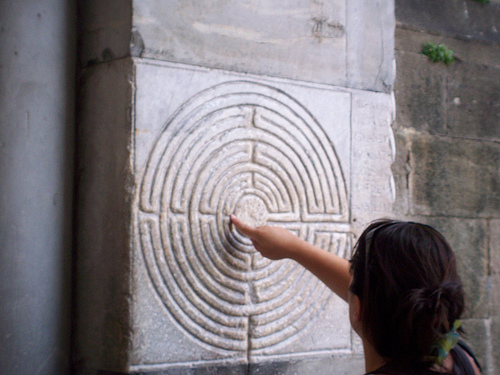We run our website the way we wished the whole internet worked: we provide high quality original content with no ads. We are funded solely by your direct support. Please consider supporting this project.

Problems with the Simple Foreknowledge View
Some have proposed a model of divine foreknowledge which allows them to avoid the dilemma of affirming either that God creates people for the purpose of sending them to hell (Calvinism) or that he creates them without certain knowledge of their fate (open theism). In this alternative view God knows that certain individuals will be damned but cannot on this basis refrain from creating them. This is called “simple foreknowledge,” for it holds that God simply knows what will take place but cannot alter it in the light of this knowledge. The fact that God foreknows what will occur does not increase his control over what occurs.
This view is somewhat different from the classical Arminian position, in which divine foreknowledge was understood to increase God’s control over what transpires without denying human freedom. The original disagreement between Arminius and Calvinistic contemporaries concerned whether God predestines the elect on the basis of his foreknowledge of their faith, as Arminius held, or foreknows the elect on the basis of his having predestined them. The Arminian position presupposes that God acts responsively to his foreknowledge. Thus, he foreknows who will believe and then predestines them.
The simple foreknowledge position denies that God can respond to his foreknowledge in this way, thus avoiding the problem of God creating individuals he knows will go to hell. In this view, God’s act of creating people is not affected by his knowledge of what will become of them. It is as though God possesses “insider information” but must buy and sell as thought he did not. For the same reason, this view does not require divine reason behind every event that occurs. God eternally foreknows each particular evil that will ever take place, but he can do nothing about it.
There are a few problems with this view. First, this and every other version of the Exhaustively Definite Foreknowledge doctrine cannot adequately account for the many passages of Scripture that depict God as facing a partly open future. Indeed, in one respect the simple foreknowledge perspective fares worse than classical Arminianism or Calvinism. Whenever Scripture emphasizes God’s foreknowledge of future events, it is to exalt his sovereign control over what is to come, which is exactly what the open view promotes.
Second, while the simple foreknowledge position avoids some difficulties by denying that God can alter his behavior in response to his knowledge of the future, it invites other difficulties. How can God respond to anything? With all Christians, defenders of simple foreknowledge want to affirm that God sometimes intervenes to bring about events that are more in line with his will. But if God can’t alter the future that he knows is coming, how can he respond to this same future when it becomes present? In the simple foreknowledge view, God must first experience events in the present as though he had no foreknowledge and then foreknow what he experienced and how he responded. In other words, his foreknowledge functions as a sort of “hindsight.”
One might be inclined to pity God if this is his predicament. From all eternity he has seen what is coming—the cosmic war, the horror, the pain, the suffering, the unending plight of the damned. And he can even foresee how he will respond to these tragedies once they occur. But he cannot do anything ahead of time to avoid them. He’s hopelessly locked into an unending vision he can do nothing about.
Third, this understanding of divine foreknowledge is irrelevant. In this view, God’s exhaustive foreknowledge doesn’t make any practical difference for God or for us concerning the flow of history. Everything proceeds as thought God did not possess Exhaustively Definite Foreknowledge. Indeed, if we hold to the pragmatic criterion of truth and insist that a belief must be able to make a conceivable difference in life to be meaningfully affirmed, then simple foreknowledge must be dismissed.
—Adapted from Satan and the Problem of Evil, pages 88-90
Image by berendbotje54 via Flickr
Category: General
Tags: Arminianism, Calvinism, Future, God, Open Theism, Satan and the Problem of Evil
Topics: Open Theism
Related Reading

What about the Gospel of John and Calvinism?
Question: The Gospel of John seems to teach that people believe because God draws them, rather than that God draws people because they believe. If this is true, how can you deny the Calvinistic teaching that salvation is based on God’s choice, not ours? Answer: As you note, many people find support for the view…

5 Observations about God Changing His Mind
One of the most significant passages that supports the open view of the future is found in Jeremiah 18. This is one of the numerous times where we find God changing his mind in response to events. By definition, one cannot change what is permanently fixed. Hence, every time the Bible teaches us that God…

Dealing With Objections to Open Theism, Part I
There are four major objections to Open Theism. Today we will deal with the first two and then tomorrow the third and fourth. For a basic introduction to Open Theism, click here. Objection #1: The open view denies omniscience. It is often argued that the open view denies the omniscience of God, even saying things…

Five Brief Philosophical Arguments for the Open View
Introduction I believe that sound philosophical arguments support the open view in which God doesn’t foreknow the future free decisions of humans. My main reasons for holding this view are biblical and theological, but since truth is one we should expect that the truths of Scripture and the truths of reason will arrive at the…

What Does a Perfect God Look Like?
The “classical view of God” refers to the view of God that has dominated Christian theology since the earliest Church fathers. According to this theology, God is completely “immutable.” This means that God’s being and experience never changes in any respect. God is therefore pure actuality (actus purus), having no potentiality whatsoever, for potentiality is…

What is the significance of 2 Peter 3:9–12?
Peter says that the Lord has delayed his coming because “he is patient with you, not wanting any to perish” (vs. 9). We are encouraged to be “looking for and hastening the coming of the day of God” [NIV: “speed its coming”] (vs. 12). If the future is an eternally fixed reality, of course God…
